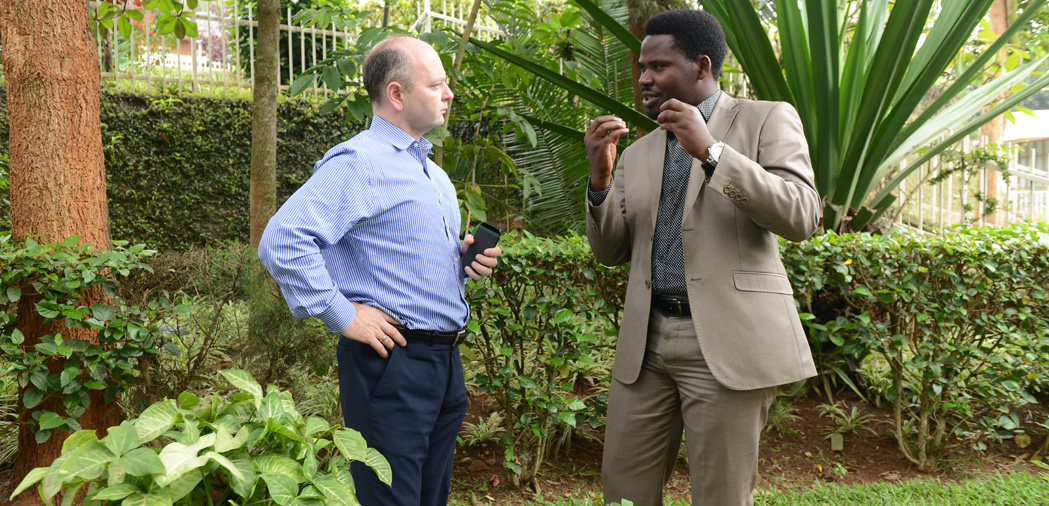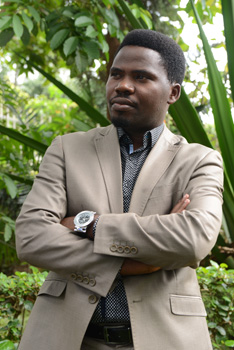A Voice in the Darkness

 Excerpted from an interview conducted by Stephen D. Smith
Excerpted from an interview conducted by Stephen D. Smith
Let me come crow the story of Rwanda.
I witnessed bad times,
I traveled to many countries,
And in each I asked
Where the tragedy that decimates
The Rwandese came from.
—“A Cock Crows in Rwanda” by Edouard Bamporiki
As a filmmaker, writer, poet, and member of the Rwandan Parliament, Edouard Bamporiki knows the importance of communication.
But when it came time for him to talk about his experience as a Hutu child watching the genocide unfold in his own town, Bamporiki was unable to speak. He is part of a generation that saw what happened, was persuaded by the ideology of hatred, and now must find the courage to overcome the devastating legacy of genocide for all Rwandans.
It was at commemoration ceremony in 2006 in Kigali that Bamporiki found his voice in public. He had been invited to recite some of his poetry, but the man who preceded him to the microphone spoke so powerfully of his experience as a Tutsi survivor of the genocide that Bamporiki felt a poem was no longer adequate. He needed to do more.
“I was there thinking about the testimony and how that guy was wounded; they called me to give the poetry, and for sure I wasn’t ready,” Bamporiki recalls. “I stayed in front of the microphone, and then I said, ‘I am not ready to give a poem, but I am ready to give testimony because I also have a testimony.’ They said to me that I should go ahead. ‘Tell us your story.’ ”
Then those that destroy my nation
Will be forgotten in Rwanda
Unless I crow about them,
So that we can remember their mistakes,
So that future generations will not poke me with their fingers.
Now 30, he was only 11 during the genocide that tore through his country, and the violence he saw confused him. He didn’t understand why his friends and teachers were being brutally murdered.
“In April 1994, I was in the hospital,” he says. “I was sick. I saw people killing others. … I could see everything. I asked my mum, ‘Why are these people killing others?’ It’s not easy to see people killing people in front of you. It was a bad image. And my mum kept silent for two, three, four days.”
Bamporiki does not consider himself a survivor of the genocide, as he is a Hutu, the ethnic group that perpetrated genocide against the Tutsi. But he does consider himself a witness able to offer a unique and honest perspective on what happened during the 100 days of killing.
“Tutsi were not [involved] in the preparation of genocide,” he says. “… [When the genocide] started, they were in the panic zone. The Hutu—including me—were in the free zone. … When you’re in a panic zone, it’s not easy for you to figure out what is going to happen. After the genocide, those survivors were missing people, [and] having trauma.’
He believes that although the Hutu live with shame, it is all the more important to speak, because shame will not bring healing to either side. That, he believes, only happens when the truth is told by everyone.
Even so, Bamporiki didn’t know if he had the right to tell his story during the 2006 genocide commemoration.
“To be honest, before 2006, I did not believe a Hutu could stand up during the genocide commemoration and give testimony,” he says. “I was happy when my message was accepted, and I was comforted, which gave me courage to go on. Fellow youth started coming, saying the truth I was promoting across the ethnic divide was crucial.”
Let us remember all of us
Our history.
You people, you quarreled.
Most of you, you fled the country.
Some of you, you stayed in Rwanda,
And you did not like what you found.
I crow to wake you up,
But you stay in your beds,
And I wonder what keeps you from me,
And I feel sorrowful.
As a young politician, Bamporiki says his goal is to use the platform he has been given to spread messages of peace. Recently, he spoke in the village where he grew up—where, not too long ago, leaders in his position used their power to encourage hatred and division among the people.
“It’s the same microphone, but what we are saying is different,” Bamporiki says. “I am using the same microphone as a politician to tell you to love your neighbors.”
Even more powerful than a politician, however, is an artist, he says. Art can gain people’s trust and promote peace and tolerance indirectly when audiences are hesitant or skeptical. Arts “move hate,” Bamporiki says.
“I believe as artists, it is our task to give the good message of peace as a way of teaching our society,” he says. “… Art is a good way to attract people.”
No matter what, survivors of genocide need to speak out about their experiences, he says. Their testimony will create a permanent record of what happened so that the genocide is remembered accurately years from now. Preserving testimonies will help younger generations learn from the mistakes of their elders and not become perpetrators themselves.
“If there is no testimony it’s like someone who is old but who doesn’t know where he comes from,” Bamporiki says. “If you want to prevent the genocide, you have to tell people what happened.”
A nation clothed in forest,
You put yourself together.
You prayed asking God
Why you must stay abroad
Even though you had Rwanda
As your home.
Like this article? Get our e-newsletter.
Be the first to learn about new articles and personal stories like the one you've just read.